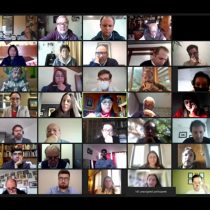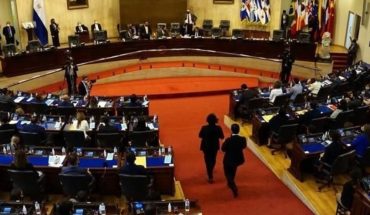
A total of 101 conventional constituents elected met, for the first time, in a virtual meeting convened by the University of Chile and the Catholic University within the framework of findings of the platform We have to talk about Chile, which promoted a series of citizen conversations in which more than 100 thousand people participated.
Improving public ethics, valuing the diversity of opinions, hope for the future of the country, the perception of a state that violates and a political system that does not care about the needs of the people, are some of the ten findings that emerged in the conversations and that are contained in the final report.
After sharing the results, the rectors and the team of We Have to Talk about Chile wanted to listen to the constituents about their own experience in terms of citizen participation and how to motivate more instances of dialogue throughout this year, as well as answer questions about the results presented and the process carried out by both universities.
In his speech, the rector of the U. of Chile, Ennio Vivaldi, stressed that the Constitutional Convention is an opportunity to incorporate the voices of the citizenry and pointed out that “what we are doing today, to present to you the work of We Have to Talk about Chile, is an example of the many activities that Chilean universities have done , they have continued to do and that we will share with you. We are absolutely available to learn from you and give our input and support to the process.”
While the Rector of the Catholic University, Ignacio Sánchez, said that “a true platform for dialogue has been developed in our country. We started planning this project in October 2019 when it became very clear that we had to listen to what the population wanted to tell us, what Chile wanted to say about their pains, dreams and longings.”
The project had the support of 27 other universities in the country and more than 50 civil society organizations, who made a special effort to reach people who usually do not participate in this type of process, such as inhabitants of rural and extreme areas, people deprived of liberty and migrants, among others.
The deputy director of the project, Valentina Rosas, said that this instance “allows us to fulfill what was promised to so many people who, from all corners of the country, trusted in this space of citizen participation. The exercise of dialogue in itself is a fundamental part, but the result of these dialogues, like those of so many other instances and projects carried out or to be carried out, seek this, to feed the public conversation and to be part of the constituent dialogue”.
This meeting is complemented by other activities that the platform has organized to publicize the findings with the authorities. Previously, the report was delivered to various leading figures — such as the president of the Senate, the national prosecutor, various National Awards, union leaders, and the government — with the aim of offering it as an input to contribute to a better design of public policies, based on the desires and concerns of the citizens in the midst of the constituent process that is already underway.





